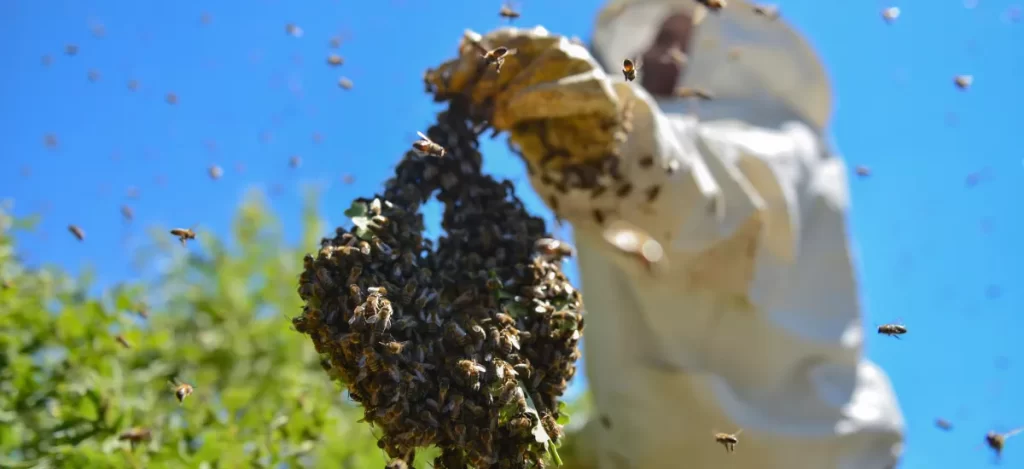Bees tend to become aggressive when faced with a threat and want to defend their colony. Also, if these bees are attacked or disturbed, they can become aggressive and stinging. Some disturbances that can cause bees to become aggressive are vibrations, dark colors, and carbon dioxide.
Bees are generally docile unless attacked or provoked. As you approach a hive, you will find that the bees are calm and solving their problems. You’ll also see an aggressive guard bee or two hovering around.
To understand why bees become aggressive, you need to understand how bees work, their nature and their personality. Notably, many bee traits are cyclical. Bees can become aggressive at any time. However, some things and situations can stop them. You may also find that these bees are more hostile in summer and early fall.

If you want to learn more about the nature of bees, buckle up. I’ll show you how to calm these bees and explain why these insects are aggressive. Additionally, I’ll discuss the types of aggressive bees and what time of day bees are most aggressive.
Read the article: Do Bees Sleep? Do Bees Sleep In Flowers?
How Do You Calm An Aggressive Bee?
It is not acceptable to set up a hive in a high traffic area. Cars generate a lot of vibration, which disturbs bees. Staggering your hives will help keep your bees calm.
#1 Dress Appropriately When Visiting The Hive
Before you visit the hive, please consider the condition of your clothing. For your own safety, please wear protective equipment. This protects you from bee stings in case they become aggressive.
Avoid brightly colored clothing as it attracts bees. Dressed in bright colors, bees liken you to flowers and want to get close to you. Some may even sting.
#2 Avoid Perfume And Other Strange Smells
Bees don’t like the smell of bananas. Bees have a keen sense of smell and use it to communicate. When a bee is threatened or feels threatened, it releases an alert pheromone, which by the way smells like a banana.
So anything that smells like a banana smells like a bee’s alarm pheromone, triggering their aggressiveness. If you walk into a banana-flavored hive, you’re bound to be attacked by bees.
Strong fragrances are also a no-no. Bees are sensitive to smells, and strong smells can trigger hostility in them.
Blowing on the hive can also trigger their aggression, because your breath has a special smell that bees recognize. Bees recognize your breath as mammalian breath. For bees, mammals are enemies and threats because they often steal honey. Therefore, it is only natural that they become violent.
Read the article: How To Start Beekeeping? (A Complete Guide To Beekeeping)
#3 Replace The Aggressive Nut Queen Bee
A colony without a queen is chaotic and prone to aggression. In addition, the posture of the queen bee greatly affects the behavior of other bees. If the queen bee is aggressive and short-tempered, the entire colony can be affected.
To make a new queen bee, you need to get rid of the existing queen bee and replace it with another queen bee. You can also let the bees raise another queen bee on their own.
To keep the hive calm, introduce a calm queen. Most of the time, it’s best to let the colony raise its own queen, especially if you want to keep this trait. However, this method may not bring peace to the hive, as the newly reared queen may be just as hostile as her predecessor.
Even so. Rejoining your colony may not be a solution. Sometimes the queen is not the culprit. The drone that mates with the queen bee may be a drone with violent traits.
#4 Wash Your Bee Protective Gear Often
If you want to calm down your bees, you have to wash your suit. Soak up some alert pheromones on your suit every time you visit the hive. As mentioned earlier, this pheromone triggers aggression in bees. Frequent cleaning of your bee suit will remove this substance.
Don’t worry about stains on your suit, just wash the alert pheromone off.
Read the article: Beekeeping And First Time Around So Many Bees
#5 Bad Weather
Bees like when the sun is shining, there is no wind and the flowers are in bloom. Extreme weather conditions can affect the mood of these insects. They get stressed when it rains, snows, and sometimes cloudy. Also, hot and humid weather makes bees uncomfortable.
As a beekeeper, you know all too well how rainy weather affects your bees. During this period, honey production may decline.
While bees can fly in the rain, they usually choose not to because it’s dangerous for them. Rain can burden the bee and hinder its flight. Bees also hate fog because this fog builds up on the bee’s body and slows it down.
Rain also significantly disrupts the bee’s wing flapping, slowing it down. To make matters worse, when it rains heavily, the giant water droplets can knock the bees out.
Interestingly, in early fall and late summer, bees are often aggressive and hostile. The reason is that winter is coming and they are also about to collect and store honey. They become defensive and very protective of the hive.
Also, the heat makes the hive very uncomfortable, which can easily irritate the bees. High humidity and heat make bees moody and short-tempered. When the weather gets too hot, the hive can get too hot to be comfortable.
#6 A Sign That The Bees Are Hungry (Lack Of Nectar)
Hungry bees are very violent. It gets worse if they are thirsty too. A lack of pollen and nectar can damage the health of bees. This defect means your bees will starve to death.
As a beekeeper, be aware of the pollen and nectar available in your area. You can do this by checking the number of blooms. Fewer flowers means less pollen and hungry bees.
Some colonies may become overcrowded, resulting in a lack of honey to feed all the bees. If you notice your bees becoming aggressive, you should check the condition of the hive. If the hive is overcrowded, you may need to evacuate it.
Lack of nectar is the most common cause of bee starvation. Farmers should watch for signs of nectar shortages.
These signs include:
Robbery: Hungry and desperate bees will do anything to survive. When hungry, you will find that your bees are robbing other hives of honey. If you see a swarm of bees fighting each other at the entrance to the hive, a robbery may be in progress. A swarm of bees can also surround the hive when they plan to steal honey.
Your Bees are Noisy: Hungry bees are irritable and will circle around the hive making an unusually loud buzzing sound.
Flower Behavior: You’ll find that bees are constantly visiting the same flowers in search of nectar residues. They will even examine flowers from which they would not normally collect nectar.
Read the article: Does Honey Freeze? What Happens When You Freeze Honey?
#7 Bee Aggression Due To Genetics
Some bees are inherently violent. Case in point: Aggressive hybridization may be responsible for bee violence. East African lowland bees are known for their hostile nature. They are sometimes called killer bees.
Hybridization between North American honeybees and East African varieties, a process known as Africanization, can cause bees to become aggressive.
Virgin queens will usually mate with any drone available in your area. However, it is not impossible to find Africanized features on some of these drones. It doesn’t matter if you are in an area with African bees.
Once the drone mates with the queen, her traits and traits are incorporated into the gene pool. If you notice that your normally docile hive is suddenly aggressive, this may be the reason.
The only remedy is to replenish your hive with already mated queen bees. Even so, you can’t be sure that queens will mate with calm drones.
#8 The Queen Bee In The Hive Is Missing
A hive with no queen is chaotic. Bees value leadership and structure the same way we humans do. This is because bees become instantly very protective and defensive of the colony as they work towards raising up a new queen.
A queen bee may die, and when this happens, the other honey bees instantly start raising another queen. During this period, the hive is a no-go zone. You can help bring things back to normalcy by bringing in a new queen.
The following signs may indicate a queen-less hive:
- Reduced bee population: With no queen to produce new eggs and brood, the hive population is likely to decrease drastically. When you inspect your hive, you will notice a decline in the number of bees present.
- More honey than usual: While this may be good news for you, it may quickly turn to reason for worry because a lot of honey in the hive may indicate the absence of a queen. No queen means no eggs, therefore the worker bees will be free to collect a lot more pollen and nectar than usual. This in turn leads to production of more honey.
- No eggs: The absence of a queen automatically means that no eggs will be produced. You need to inspect the brood chamber often to keep track of the number of eggs produced/ a reduced number of eggs, or no eggs at all means that there is no queen.
#9 Bee Reaction To Predators
Bees are very careful when predators want to steal their honey. This vigilance may be seen as aggressive. Predators such as bears, skunks, wasps and other insects can make bees irritable. They can also be considered predators if you open the hive frequently.
Any animal (including you) that goes to the hive for honey is considered a threat. Because of this, bees will always remain defensive and protect their hive.
#10 Manipulation And Frequent Hive Inspections
Bees hate it when you keep opening the hive and probing around. Instead, they prefer peace and quiet. Every time the hive is opened, whether for inspection or for honey, it disturbs the tranquility inside. This makes bees moody and they can become defensive.
To make things easier, minimize your hive visits. Turn it on only when necessary. Even after opening, be careful with your movements. Avoid sudden movements as you may kill a bee.
Also, be sure to visit the hive when the time comes. Make sure the weather is nice and calm. The best time to visit the hive is early morning or early evening. Also, always bring your bee smoker with you when visiting the hive, but use it sparingly.
Read the article: What Happens When You Add Honey To Hot Tea? Does Honey Lose Nutrients?
#11 Bee Queen Attitude
The temperament of the queen bee affects the overall mood of the hive. If the queen is calm and peaceful, the hive will have the same vibe.
Unfortunately, the opposite is true. If the queen bee is naturally aggressive and hostile, all other bees adopt this trait. When this happens, it’s often hard to quell such a crush. All that the beekeeper is left with is to get rid of the enemy queen and replace it with a cooler queen.
#12 Bees Are Infected With Varroa Mite
Varroa mites are small reddish-brown insects known to infest beehives. These mites are bad news. They not only feed on adult bees, but also feed, forage and reproduce on bee larvae and pupae in the hive.
The result is a malfunctioning and debilitating bee.
In addition, Varroa mites transmit many viruses that are harmful to the colony. You need to watch out for Varroa mite infestation in the hive.
The following signs indicate the presence of these parasites:
- Chewed and dented honeycomb lids
- Larvae spread throughout the hive
- Abnormal reproductive patterns, and,
- Fewer bees
Varroa mites have a variety of effects on bees. Some of these effects are:
- Reduced bee lifespan
- Impaired flight performance of worker bees
- crippled bees
- Reduced worker bee weight and size
When inspecting your hive, be sure to do regular thorough inspections to rule out a mite infestation. Note that these parasites are usually unevenly distributed in the hive, and their concentration depends on the weather.
Therefore, it is best to check your hive regularly. This infestation makes the bees uncomfortable and leads to aggressive behavior.
Reasons Why Honey Bees Can Be Aggressive?
Bees tend to be aggressive for a number of reasons. Like any other animal, a bee will do anything to protect its property.
Additionally, an uncomfortable environment can make bees feel stressed and irritable, which can lead to violence. Certain conditions can make bees aggressive.
Read the article: Do Bees Poop, Pee Or Vomit And Is Honey Bee Poop?
Which Type Of Bee Is Particularly Aggressive?
While most bee species are generally calm unless provoked, some are naturally hostile. Such bees are rarely quiet.
For example, Africanized honeybees are known to be very aggressive. These bees are very similar to European bees. However, they are known to be the most aggressive bees than any other bee species.
Africanized honeybees will attack with little disturbance. Their attacks always come in large numbers and are likely to be fatal to any animal they attack.
One of the deadliest things about Africanized bees is the number of attacks they attack. Despite their aggressiveness, Africanized honeybees have less potent venoms than other honeybees.
The main reason Africanized honeybees are so aggressive is their sensitivity to alarm pheromones. Further research showed that Africanized honeybees responded 2.4 times faster to alarm pheromones and 30 times faster to moving targets. This made her very hostile.
Once Africanized bees are stimulated, they sting anything that moves within their line of sight. You can even track them for up to a kilometer. Their quick response to disturbance is due to their natural environment.
Their common tropical climate is also home to large numbers of predators. These predators frequently attack their colonies. Africanized bees had to adapt to this environment through violence and defense.
Africanized bees are also known as killer bees due to their hostile nature. They can track prey up to 100 meters away. That’s ten times as fast as bees follow their victims. Bees are known to hunt down their victims as far as 10 meters away.
Their violent nature helps them successfully defend their colony. Aggression also favors the high development of rapid colony defenses. Thus, thriving hives can survive and produce more offspring that will live in their offspring than hives that kill predators.
The nature and genetics surrounding Africanized honeybee biology, including their aggressiveness, best explain their ability to successfully invade the world. Africanized honeybees have conquered most of the world.
In doing so, they have caused and continue to cause serious problems by disrupting native pollinator communities, especially when competing for food and nests. It’s all thanks to their aggressiveness, which makes them nearly invincible.
Read the article: How To Inspect Bee Colonies Without Bee Stings
Which Part Of The Day Are The Bees Most Aggressive?
Fortunately, bees are not always aggressive. Even so, there is no set time for when bees are aggressive. It’s nearly impossible to tell the bees to become aggressive in the afternoon or morning. These bees can become aggressive at any time.
However, bees often become aggressive when something annoys them. No matter the time of day, if you provoke a swarm of bees, they are likely to become violent and sting you.
Also, as mentioned earlier, bees don’t like periods of bad weather. You’re more likely to encounter a swarm of aggressive bees on a hot, humid afternoon than on a calm, dry day.
You may be wondering why beekeepers typically conduct hive inspections and honey collection in the evening or early morning. This is because bees are calmer during these times. With the exception of Megalopta bees, most bees are dormant at night.
However, the queen bee remains active day and night, especially when it comes to laying eggs, especially in April and May. Aggressive bees are unlikely to be encountered at night unless provoked. Even if they don’t sleep, they rest and don’t fly around.
Some nocturnal bees, such as the Megalopta species, can be aggressive at night as well as during the day. Even so, it’s best not to irritate bees at any time of the day.
When provoked, bees need time to calm down. How long they remain hostile depends on the cause of the aggression. However, this does not apply to naturally aggressive bees. There is no set time for how long it will take them to calm down. Best to leave them alone.
If the weather is the reason for their fluctuations, the weather changes will calm them down. However, this can take a long time.
With frequent inspection and manipulation of the hive, the bees need less time to calm down. If you leave them alone, they will calm down. Fortunately, bees are calm most of the time, and even when they become aggressive, they calm down more quickly than other bee species.
Conclusion
As a beekeeper, aggressive bees are a fact of life. All you have to do is find the source of the aggression and deal with it. And learn how to best calm them down!

